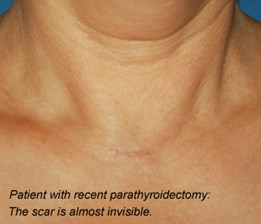Endocrine Surgery

The section of Endocrine Surgery incorporates the most modern technical approaches to the diagnosis and treatment of endocrine disorders requiring surgery. The experienced surgeons in this section handle a whole host of problems associated with thyroid and parathyroid diseases, which are the most common endocrine surgical disorders.
Parathyroid surgery, in particular, is now modernized so patients can be treated with minimally invasive operations, frequently performed as outpatient procedures. Patients have surgery through a very small incision, usually not longer than an inch, so cosmetic results are superior, with scars that become almost invisible after a while.
The outcome of surgery is almost always known at the time of the operation, because the endocrine surgeons can monitor the level of hormone which was abnormal before surgery, and see that it comes down to a normal level during the procedure. This minimizes the chances of having a second operation, a situation which occurred sometimes in the past.

The specialists in this section routinely perform procedures that affect the thyroid, parathyroid, pancreas and adrenal glands. Thyroid nodules are routinely diagnosed by minimally invasive procedures, such as Fine Needle Aspiration and Biopsy, performed in an office setting with no more discomfort than can be expected from having blood drawn.
In a 12 month period, the surgeons of this section usually perform:
- Thyroid resections: 63
- Parathyroid resections: 23
Additionally, surgeons perform yearly several pancreatectomies and laparoscopic adrenalectomies for endocrine disease.